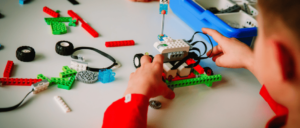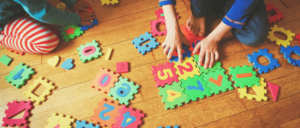Nurturing Creativity and Imagination through Play-Based Education
Introduction
There’s no limit to creativity. Every time we use it, it levels up more. It never exhausts and you just get better and better. We all can agree that creativity is an important aspect of life which is a result of critical thinking and imagination. It is due to creativity a man can enjoy his life and create hypothetical situations and new ideas and bring them to life. It is often said that intelligence and fun equals creativity and we would agree that is rather true. A creative person is of course, intelligent enough that he/she can think out of the box and that too, critically, have a strong imagination and put it in a way that seems real to us.

Now, there can be different edifices of different people who can or cannot be creative. Some believe that creativity comes naturally and others believe that creativity is within everyone and it just needs to be nurtured. We firmly believe that every human being has infinite potential and they just need the right opportunities and training to unravel it. The human mind is a complex thing and we can certainly train it and bring out its potential creativity. Continuing with the belief that creativity can be nurtured, let us talk about the different aspects related to creativity and the role a play school can play in nurturing it in our little ones.
Importance of creativity:

Creativity in today’s world is a highly valued characteristic. It is not so only because creative people are hard to find but also because it is a necessity in many ways. It is essential for everyone to be creative, even if only a little bit, as it helps us in problem-solving and leads to innovations. Imagination plays an important role in the problem-solving fora as due to imagination, a person critically thinks about the consequences of their solutions on the people or companies, whatever they are concerned with. And innovations are a result of creativity and curiosity. These two things are keys to innovations and can only exist when a mind is set free of obstacles. Creativity is the key to successful professions like writers, artists and many more.
Adverse effects of traditional learning methods on creativity:

Traditional learning has included facts and certain concepts that are expected to be memorised and not to be questioned. The schools are focused on just filling the human mind with this information. They believe that this is what education is only about. But do you think that education should be so much conformed to just rote learning? Why do not we educate our children in such a way that enhances their critical thinking, makes them question older concepts and devise new ones?

The main problem in our educational system has always been that it has always been focused on confining us to rote learning the same old things and has never tried to make the students creative and innovative. This confinement to textbooks impedes a student’s creativity and blocks it out forever. The need is to change this educational system and devise and implement it in a way so that the students come out with knowledge as well as creativity. Routine learning does not obstruct their creativity of mind and sets them free. In these cases, we believe that play schools are a step ahead and are reforming this educational process from the base level itself.
Unleashing Creativity through Play-Based Education

In a world where innovation and creativity are highly valued, it’s essential to nurture these skills from an early age. Play-based education is a powerful tool for doing just that. By blending learning with play, we can unlock a child’s innate creativity in a natural and enjoyable way. Play encourages exploration, experimentation, and imagination. When children engage in activities like building with blocks, creating art, or playing make-believe, they are actively using their minds to solve problems and think outside the box. This fosters a creative mindset that can benefit them throughout their lives.

One key aspect of play-based education is its ability to promote open-ended learning. Unlike traditional teaching methods that follow strict guidelines, play allows children to set their own rules and boundaries. This freedom encourages them to come up with unique solutions and ideas. For example, while playing with building blocks, a child might decide to build a rocket ship instead of a house, sparking their imagination and creativity.
Furthermore, play-based education promotes collaboration and communication. When children engage in group play, they learn to share ideas, negotiate, and work together to achieve a common goal. These skills are invaluable in the creative process, as many breakthroughs come from the exchange of diverse perspectives and ideas.

Additionally, play-based education often involves storytelling and role-playing, both of which require creativity to develop characters, plots, and scenarios. These activities enhance a child’s storytelling abilities and help them express their thoughts and emotions in imaginative ways.
Conclusion
Play-based education is a powerful catalyst for creativity. It encourages exploration, open-ended learning, collaboration, and storytelling – all of which are essential skills for nurturing a creative mindset. By integrating play into education, we can prepare our children to become innovative thinkers and problem solvers, equipping them for success in a rapidly changing world.





